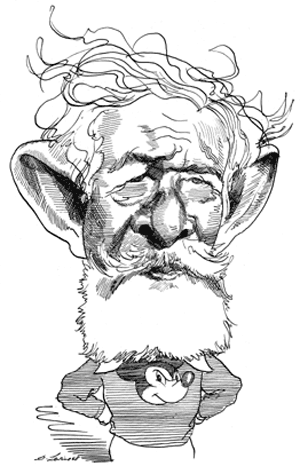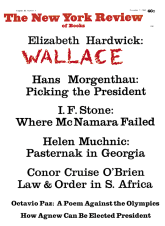Whenever university administrators or professors are trying to extract money to finance some new development, they declare how essential it is for the university to keep pushing forward the frontiers of knowledge. It might be all for the good if they were asked: “And how do you propose to get your students to help push?” It can sometimes happen. Back in the 1920s in Cambridge, England, when the New Criticism was being born, I. A. Richards, struggling with the fundamental problems of meaning and value in poetry, handed his audience of undergraduates a sheet of a dozen poems, date and author unrevealed, and asked them to say what each poem was about and whether it was a good or bad poem. The results of this inquiry were startling. A poem by Longfellow was thought superior to one by Hardy, and the verses of Ella Wheeler Wilcox and of a First World War army chaplain, known as Woodbine Willie, were preferred to Hopkins and Lawrence. There was not the faintest agreement about the meaning of any one poem: a greeting to Meredith on his birthday was confidently asserted to be a cavalier drinking song. Richards drew some conclusions on the causes of this singular lack of success. Not only had his audience read too little poetry, not only were they unable to construe their own language, not only were they immature, but they brought to the text a mass of preconceptions and—most fatal of all—stock responses. They lacked sincerity of feeling. They responded to poems as if they were advertisements. They had never let the poem penetrate to the heart, nor let the heart be guided by the informed use of their intelligence.
Among the audience was an undergraduate a little older than his contemporaries. Most than a year before he had been found to be in the early stages of tuberculosis, and his friends got up a subscription to send him to Southern Italy for a year. He had returned cured and was to obtain the exceptional honor of a first class with distinction in his final examinations. In a sense, T. H. White lived the rest of his life according to his own interpretation of I. A. Richards’s teaching. What mattered was your feelings and whether they were genuine and personal, and not second-hand aphorisms. White doubted whether truth existed or could be deduced by reason. He did not doubt, however, that being true to what you felt and taking the utmost trouble to express those feelings as exactly as possible in words, were of supreme importance.
But what happens if you feel with perfect sincerity most deplorable things, or, worse, are unable to feel what you think you ought to feel? Are sense and sensibility never to discipline the feelings or give them a profounder meaning? Or should you act out your feelings without regard to the feelings and claims of others? Faced with this dilemma most of us stagger along making compromises of one kind or another to suit our conscience and temperament. White was unable to resolve the dilemma. It made him a miserable man, drove him to drink, and maimed his development as a writer.
HE EMERGED thoroughly knotted up from his childhood. His father, a superintendent in the Indian police, had taken to the bottle after his monster of a wife refused ever again to have sex after their child was born. His parents separated when he was fourteen, at a time when he was tortured by the usual brutality and philistinism of his English public school. When he was grown up he discovered that he was incapable of having a satisfying relationship with any human being. He fell in love—sometimes with boys, sometimes with girls—but he either remained mute, remote, and adoring, or was overwhelmed by the desire to hurt and wound his beloved. Concluding that he was a sadist, he tried analysis, but decided that solitude was the best remedy. In such cases there is always another remedy, namely, to find a substitute, and this he found in the shape of a red setter bitch which had been given him, and which he had nursed through distemper. He was broken with grief when, eleven years later, she died; he had hardly ever spent a night away from her except the night she died, and he sat up with her corpse for two days and nights. Later he befriended some deaf and blind sufferers, in particular a spinster whom he petted and treated with tenderness, learning Braille for her sake. He sentenced himself to long periods of solitary confinement to do the one thing that gave his life meaning, namely, learning to do things such as shooting, fishing, flying an airplane, hawking; and then, through his books, communicating to others his joy and frustration in doing them.
Advertisement
And yet he idolized people: sometimes for their simplicity and directness, sometimes because they could do the things he wanted to do better than he could. He began to correspond with David Garnett, who had given him a sympathetic review, because he persuaded himself that Garnett was a scholar as well as a fisherman and a pilot. Their correspondence shows why he kept his friends hard though he tried them.
White could be maddening, perverse, difficult, rude, and, when sodden, a bore. He wrote of his love for rural England in a book called England Have My Bones, but Ireland had his bones during the war when as a pacifist he adopted an aggressive neutralism and nearly became a Roman Catholic. After the war he settled in the Channel Islands to defeat income tax, which, like Shaw and Edmund Wilson, he regarded as a peculiarly insulting way of persecuting authors. He set his freedom to do as he liked beyond friendship or anything else. But his friends remained faithful. He had such resilience and vitality. They leaped off every page he wrote. His fears, his unhappiness, his wild lack of principle were as nothing to the loyalty he displayed to his friends and his palpable need for them. But what above all preserved him was his sense of comedy. Many of his letters describe with amused hopelessness the mis-adventures which steadily befell him. It was this that kept him old and devoted friends, such as his Cambridge tutor, and those whom he had rarely, if ever, met. His abuse and his self-abuse were sterilized by his humor and did not poison his friends. They were touched by his troubled heart.
WHITE WROTE excellent English prose: wiry, unembellished, sardonic, and inventive. Like the Georgian poetry which he also wrote, it smelled sometimes of the lamp. But his power of fantasy, metaphor, and inventiveness redeemed the bookishness. For all his idiosyncrasies he was very much of his time. English writers between the wars were oppressed by the sight of rural England dying. Rural habits and traditions, as they had existed for centuries, were being extinguished by the spread of urban culture. Inspired by Hardy and Housman, or by George Sturt, a stream of books extolling life in country cottages, village curios, farming and country pursuits, flowed from the press, hardly impeded by satires such as Stella Gibbons’s Cold Comfort Farm. To contrast the pure, spontaneous, and profound life of country people, who grow intertwined with Nature, with the brittle, febrile, corrupt, money-grasping, fetid life of cities and towns is as old a notion as Arcadia itself. But there is something almost desperate in the despair with which Lawrence and Forster foretold the doom of rural England, about the profusion of Tennysonian descriptions of Nature in Georgian poetry, and about the intricate embroidery, like smocking on a child’s frock, with which novelists wove together themes of Pan and the supernatural with their belief in the power of Nature to heal. English intellectuals in the inter-war years had more cause to feel alienated from society than they have today, when they are more numerous and are flanked by new classes of white-collar workers. Their obsession with rural life was as much an attempt to get into rapport with a society which made “genuine” responses to their surroundings and was concerned with “real” things as it was a nostalgic and despairing protest against the submersion, under the waves of industrial culture and tourism, of a pasture which had hitherto been supreme in nourishing the imagination of writers.
White realized that much of this writing was sentimental and second-hand: he distinguished sharply between the poetry of Edward Thomas and that of Rupert Brooke. He was always on the watch for passages of fine writing making their unwelcome appearance in his own prose. Among those whom he particularly admired was Sylvia Townsend Warner, whose novels combined his own love of the country and his delight in fancy, and she has repaid his devotion by writing an excellent biography of someone she never met but has entirely understood: she neither claims too much nor admits too little. She perceives that White was too serious about writing ever to destroy his talent. Loneliness and sadness may have driven him to learn how to plough or to train hawks and dogs, but the learning was incidental and only sufficient to get experience first-hand and thus enable him to write.
HE WROTE to teach. He was indeed a born teacher, and for a few years after leaving Cambridge was a schoolmaster until he decided that he would earn his living as a writer. He had some success, which both delighted and disgusted him: at the end of his life he got a windfall when that deplorable musical, Camelot, was made out of his Arthurian cycle. The Once and Future King is characteristic of his inventiveness, his inconstancy, and his seriousness. It began with the magical children’s book The Sword in the Stone, and a second volume in the same vein. He then discovered that there was something important for him to say about the Arthurian legend, the futility of war, and the future of England: so he rewrote the second volume, wrote a third, quarreled with his publishers about the fourth and fifth, and fifteen years later brought it out as a tetralogy. The odd mixture of dignity, sadness, fancy, and buffoonery in the book was characteristic of his own life.
Advertisement
Teaching, however, is a dangerous profession. You have to learn early on that you will not be able to impose your views on anyone who is worth teaching, and that even those who accept some of them will use them for their own purposes. Tim White was an incomparable schoolmaster. He not only stimulated and shattered conventions, he was very severe. He detested the pseudo-sophistication of clever boys and tried to shame them into writing or saying what they felt. He preferred those who knew how to ride or fish or with whom he could catch snakes or go ferreting. But boys have a cruel eye for weakness. The clever ones waited for him to expose himself to their satire, the country-born watched him show his incompetence at things they had been bred to do. When he gave up his post he wrote: “I am beginning to find there is something horrible about boys in the mass: like haddocks.” Throughout his life he went about roaring, blasting, tyrannizing, appealing to people to stay and be taught to redeem themselves, and all that appeared to happen was that the haddocks stared back. But quite a number swam after him.
This Issue
November 7, 1968




